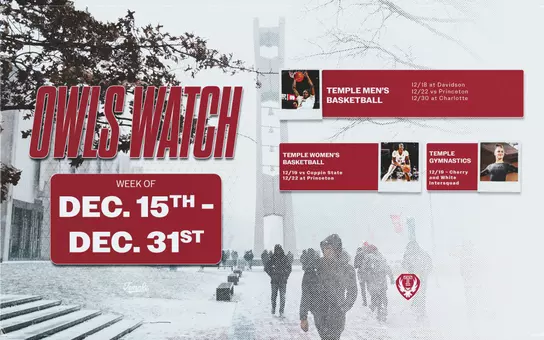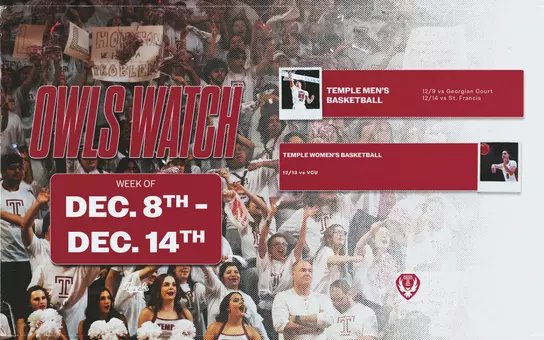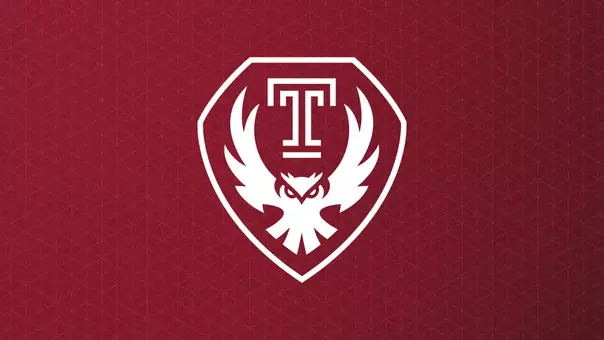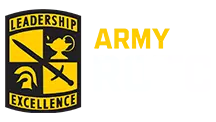Temple University Athletics

Hardwiring 101: Temple Implements Business Model to Better Understand its Student-Athletes
8.7.19 | General
Technology is constantly improving to help athletes become, as the popular 70s television show Six Million Dollar Man immortalized, "better, stronger, faster." Temple University Athletics, like most NCAA Division I schools, seeks out new cutting-edge technology and implements it to help its student-athletes succeed.
But what about the mind? What makes each student-athlete succeed, and how do you find out what is the best way to motivate these young men and women? What makes a championship level athlete?
Temple believes it may have found the answer to what makes its student-athletes tick by utilizing Caliper, an assessment tool businesses have been using since the 1960s.
Why Caliper?
"When we started developing leadership curriculum and leadership programming we brainstormed ways we could actually measure, track and look at progress of our student-athletes," said Justin Miller, Senior Associate Athletics Director for Academics and Career Services. "So while working with some faculty from the Fox School of Business, I was referred to the Caliper Assessment. As I learned more about it became obvious that it was a great fit for our needs. It is not a personality test, but rather looks at tendencies or how an individual is hardwired to respond to certain situations.
This now allows us to evaluate our student-athletes using common language and identify circumstances that may cause stress or require extra energy. It also uncovers areas one may find challenging or conversely – be a natural tendency - and then allows us to have tangible conversations with our student-athletes."
Temple University's Director of Athletics Dr. Patrick Kraft has enriched the student-athlete experience ten-fold in his four years at the helm of the department. In that time he has increased support staff with the hiring of the department's first mental health professionals, enhanced and built facilities and worked to bolster career services for student-athletes. So Caliper fit right into his philosophy of "student-athlete first."
"When Justin approached me about Caliper and its potential to develop our student-athletes both on the field and beyond, it was a no-brainer," explained Kraft. "We have emphasized a holistic approach to our student-athlete experience and this assessment will help our young men and women succeed in life far after Temple."
Founded in 1961, Caliper has been mainly utilized in the corporate world, providing companies with an assessment tool for its employees and potential hires. As its website states, "the Caliper Profile can help you select top talent, predict future performance, coach leaders, and create an ideal environment for high-performing teams to flourish with precision and confidence!"
It was not until the 1980s, however, that the company started working with professional teams.
"A large majority of what our company does is in the corporate world and the private sector. We have also over the years worked with professional athletes," said Tom Schoenfelder, Principal Scientist & Head of Academic Research and Partnerships at Caliper. "For years we have been assessing players under consideration for the draft. Organizations would ask us to access and use personality dynamics to give them insight into (prospects) competitiveness, coach-ability, self-discipline, resiliency, mental toughness. All of the things you could expect with respect to an athlete's personality. We would make a recommendation whether they should fire away in the first round pick or probably hold back and reconsider based on various traits the person has."
Caliper is involved with Major League Baseball, the NBA and the NHL, but Temple is one of the first athletic departments to explore the assessment tool with its student-athletes.
"It is unique (at the college level)," explained Schoenfelder, who earned both his master's and doctorate's degrees in industrial/organizational psychology from Temple. "We have done a couple of things with some other universities and impact teams like Rutgers and Princeton, but what Justin is doing here is by far a unique endeavor.
Temple is going across the board, looking at all of its student-athletes through a systematic process with a specific goal. And the goal is to provide on the field coaching support and leverage the information gathered to provide other developmental opportunities and some insight for the student-athletes around career choices and leadership skills. It is a much more holistic way than we have done in the past."
How Does Caliper Work?
Caliper is a forced choice assessment. An individual is given a series of four statements and they have to select the one statement that most describes them and the one that least describes them. It looks at how individuals would respond to certain situations and from that make assessments.
"The full profile of the assessment has 22 traits that are well researched," said Schoenfelder. "Is it 100 percent (accurate), no, but nothing in psychometrics is actually 100 percent, but we are right more than we are wrong. Caliper, for better or worse, has been emphasizing the science of this assessment. There are definitely downsides to this. It is a longer assessment. It takes a lot of data. The upside is we really beat the heck out of it in terms of the psychometrics and making sure that it is actually predicting something."
"It gives us insight into our student-athletes in a really quick glimpse," adds Miller. "I like it for our freshmen because now we are learning about what makes them tick within weeks of their arrival on campus. We have an idea of who they are and what their natural tendencies may be. We can see how they are hard-wired."
The Temple-Caliper Approach
Miller and his team introduced Caliper to Temple Athletics in the fall of 2018. Throughout the course of the academic year, 555 total assessments were gathered encompassing all 19 of the University's varsity athletic teams.
From an athletics viewpoint, Caliper analytics have provided summary reports for teams – including reports by trait, such as mental toughness. This provides coaches a better understanding of their teams and how individuals function as a group.
Temple women's lacrosse coach Bonnie Rosen has been one of the strongest advocates for the value and benefits of the Caliper Assessment tool. The US Lacrosse Hall of Famer is always looking for the latest technology to give her players an advantage.
"We identified some areas through Caliper, for instance our mental toughness category, where we were not always that strong," said Rosen, who is entering her 14th year at Temple. "We were not always that great in handling difficulties that came at us at the time which is one of the things it measured. We were really persistent at coming back after setbacks. So we were high on a persistence scale, but low on a stress scale and that is actually something we have witnessed with our team.
So, with this knowledge extracted from Caliper, we can focus on increasing more competition moments in our practice – increasing stressful play and how to execute. We already have the persistence piece that gives us that mental toughness resolve, but we would like to not have to use that part by actually being better under the initial stress."
On the academic side, Miller introduces Caliper early on with his freshman seminar, spending three class courses to introduce self-awareness and communication through exercises built around the assessment tool. Caliper was also used in the selection process of the first class of the FLIGHT Leadership Academy that begins in the fall semester. It is a key asset in building the leadership academy workshops including, but not limited to: emotional intelligence, teamwork and collaboration, effective communication, time management.
"From an academic standpoint our goal moving forward is that we want to take all of these metrics, all of the competencies, and actually see what correlates with data we regularly track on student success," said Miller. "So looking at a student's profile we can then look at their academic performance, their athletic performance, their performance in strength and conditioning and determine if there is any type of connection that can be made. We may find that students with certain profiles are more predisposed to positive academic experiences, or maybe see more growth in the weight room. Predictors that we can then use to help our students and provide customized support for them.
A lot of what I love about Caliper is that it does not take into consideration talent at all. It is about how you are hard-wired. The example I give the students is that my social scores are very low. I am good at those things, but I am exhausted at the end of the day. So what we tell the students is that (the score) does not mean you are not good, it just means it may be a little harder for you. It may not be your tendency. It helps us with that conversation with the student."
Assessing the Assessment
So does Caliper work? Has it been a useful tool in year one for Temple athletics?
"I do think over time we are going to learn a little bit more about how to use this, but from first glance I do think the assessment seems pretty true to what we experience out of our players," said Rosen. "It has allowed us as coaches to think a little bit more on how to get the most out of each player and to come at them from different angles.
I think there are some neat places as a coach to better coach a team at the personality level of individuals, but I am equally excited for the individual players and the team as a whole for them to learn how to use this information to be a better team."
Miller views this as a win on multiple levels.
"One of the great things about Caliper is the variety of reports we can receive," he said. "We have a report that our students are getting. We have a report that our coaches are getting. And the other report we are going to work with – is the individual development guide. How the students are going to get better. We are having the students fill out a workbook to provide them with a game plan on how they are going to develop in the areas they want to see growth in. Everyone receives a profile about themselves."
Women's soccer co-captain Molly Tobin is a strong advocate of Caliper, and sees the value of this type of assessment.
"It has benefited me in my leadership ability," said the senior midfielder. "Although it told me a lot about my strengths, a lot of my weaknesses I did not know I had. Alyssa Drachslin (Temple's coordinator for leadership and professional development) and I went over how to work on those weaknesses. If I did not know about them, I probably would not have fixed them. So I definitely think that if I am able to fix a lot of those weaknesses it will not just help me academically or in business, but on the field as well."
Caliper will become even more useful as Temple gathers more data with each incoming class of student-athletes. As the sample pool enlarges, the tool should become even more predictive.
"We have plans to continue to find new and innovative ways to incorporate Caliper in the student-athlete experience." Miller explains. "Through the commitment from Dr. Kraft, coaches, and students we are enthusiastic about using the data to better serve our student-athletes in their long-term holistic growth."
But what about the mind? What makes each student-athlete succeed, and how do you find out what is the best way to motivate these young men and women? What makes a championship level athlete?
Temple believes it may have found the answer to what makes its student-athletes tick by utilizing Caliper, an assessment tool businesses have been using since the 1960s.
Why Caliper?
"When we started developing leadership curriculum and leadership programming we brainstormed ways we could actually measure, track and look at progress of our student-athletes," said Justin Miller, Senior Associate Athletics Director for Academics and Career Services. "So while working with some faculty from the Fox School of Business, I was referred to the Caliper Assessment. As I learned more about it became obvious that it was a great fit for our needs. It is not a personality test, but rather looks at tendencies or how an individual is hardwired to respond to certain situations.
This now allows us to evaluate our student-athletes using common language and identify circumstances that may cause stress or require extra energy. It also uncovers areas one may find challenging or conversely – be a natural tendency - and then allows us to have tangible conversations with our student-athletes."
Temple University's Director of Athletics Dr. Patrick Kraft has enriched the student-athlete experience ten-fold in his four years at the helm of the department. In that time he has increased support staff with the hiring of the department's first mental health professionals, enhanced and built facilities and worked to bolster career services for student-athletes. So Caliper fit right into his philosophy of "student-athlete first."
"When Justin approached me about Caliper and its potential to develop our student-athletes both on the field and beyond, it was a no-brainer," explained Kraft. "We have emphasized a holistic approach to our student-athlete experience and this assessment will help our young men and women succeed in life far after Temple."
Founded in 1961, Caliper has been mainly utilized in the corporate world, providing companies with an assessment tool for its employees and potential hires. As its website states, "the Caliper Profile can help you select top talent, predict future performance, coach leaders, and create an ideal environment for high-performing teams to flourish with precision and confidence!"
It was not until the 1980s, however, that the company started working with professional teams.
"A large majority of what our company does is in the corporate world and the private sector. We have also over the years worked with professional athletes," said Tom Schoenfelder, Principal Scientist & Head of Academic Research and Partnerships at Caliper. "For years we have been assessing players under consideration for the draft. Organizations would ask us to access and use personality dynamics to give them insight into (prospects) competitiveness, coach-ability, self-discipline, resiliency, mental toughness. All of the things you could expect with respect to an athlete's personality. We would make a recommendation whether they should fire away in the first round pick or probably hold back and reconsider based on various traits the person has."
Caliper is involved with Major League Baseball, the NBA and the NHL, but Temple is one of the first athletic departments to explore the assessment tool with its student-athletes.
"It is unique (at the college level)," explained Schoenfelder, who earned both his master's and doctorate's degrees in industrial/organizational psychology from Temple. "We have done a couple of things with some other universities and impact teams like Rutgers and Princeton, but what Justin is doing here is by far a unique endeavor.
Temple is going across the board, looking at all of its student-athletes through a systematic process with a specific goal. And the goal is to provide on the field coaching support and leverage the information gathered to provide other developmental opportunities and some insight for the student-athletes around career choices and leadership skills. It is a much more holistic way than we have done in the past."
How Does Caliper Work?
Caliper is a forced choice assessment. An individual is given a series of four statements and they have to select the one statement that most describes them and the one that least describes them. It looks at how individuals would respond to certain situations and from that make assessments.
"The full profile of the assessment has 22 traits that are well researched," said Schoenfelder. "Is it 100 percent (accurate), no, but nothing in psychometrics is actually 100 percent, but we are right more than we are wrong. Caliper, for better or worse, has been emphasizing the science of this assessment. There are definitely downsides to this. It is a longer assessment. It takes a lot of data. The upside is we really beat the heck out of it in terms of the psychometrics and making sure that it is actually predicting something."
"It gives us insight into our student-athletes in a really quick glimpse," adds Miller. "I like it for our freshmen because now we are learning about what makes them tick within weeks of their arrival on campus. We have an idea of who they are and what their natural tendencies may be. We can see how they are hard-wired."
The Temple-Caliper Approach
Miller and his team introduced Caliper to Temple Athletics in the fall of 2018. Throughout the course of the academic year, 555 total assessments were gathered encompassing all 19 of the University's varsity athletic teams.
From an athletics viewpoint, Caliper analytics have provided summary reports for teams – including reports by trait, such as mental toughness. This provides coaches a better understanding of their teams and how individuals function as a group.
Temple women's lacrosse coach Bonnie Rosen has been one of the strongest advocates for the value and benefits of the Caliper Assessment tool. The US Lacrosse Hall of Famer is always looking for the latest technology to give her players an advantage.
"We identified some areas through Caliper, for instance our mental toughness category, where we were not always that strong," said Rosen, who is entering her 14th year at Temple. "We were not always that great in handling difficulties that came at us at the time which is one of the things it measured. We were really persistent at coming back after setbacks. So we were high on a persistence scale, but low on a stress scale and that is actually something we have witnessed with our team.
So, with this knowledge extracted from Caliper, we can focus on increasing more competition moments in our practice – increasing stressful play and how to execute. We already have the persistence piece that gives us that mental toughness resolve, but we would like to not have to use that part by actually being better under the initial stress."
On the academic side, Miller introduces Caliper early on with his freshman seminar, spending three class courses to introduce self-awareness and communication through exercises built around the assessment tool. Caliper was also used in the selection process of the first class of the FLIGHT Leadership Academy that begins in the fall semester. It is a key asset in building the leadership academy workshops including, but not limited to: emotional intelligence, teamwork and collaboration, effective communication, time management.
"From an academic standpoint our goal moving forward is that we want to take all of these metrics, all of the competencies, and actually see what correlates with data we regularly track on student success," said Miller. "So looking at a student's profile we can then look at their academic performance, their athletic performance, their performance in strength and conditioning and determine if there is any type of connection that can be made. We may find that students with certain profiles are more predisposed to positive academic experiences, or maybe see more growth in the weight room. Predictors that we can then use to help our students and provide customized support for them.
A lot of what I love about Caliper is that it does not take into consideration talent at all. It is about how you are hard-wired. The example I give the students is that my social scores are very low. I am good at those things, but I am exhausted at the end of the day. So what we tell the students is that (the score) does not mean you are not good, it just means it may be a little harder for you. It may not be your tendency. It helps us with that conversation with the student."
Assessing the Assessment
So does Caliper work? Has it been a useful tool in year one for Temple athletics?
"I do think over time we are going to learn a little bit more about how to use this, but from first glance I do think the assessment seems pretty true to what we experience out of our players," said Rosen. "It has allowed us as coaches to think a little bit more on how to get the most out of each player and to come at them from different angles.
I think there are some neat places as a coach to better coach a team at the personality level of individuals, but I am equally excited for the individual players and the team as a whole for them to learn how to use this information to be a better team."
Miller views this as a win on multiple levels.
"One of the great things about Caliper is the variety of reports we can receive," he said. "We have a report that our students are getting. We have a report that our coaches are getting. And the other report we are going to work with – is the individual development guide. How the students are going to get better. We are having the students fill out a workbook to provide them with a game plan on how they are going to develop in the areas they want to see growth in. Everyone receives a profile about themselves."
Women's soccer co-captain Molly Tobin is a strong advocate of Caliper, and sees the value of this type of assessment.
"It has benefited me in my leadership ability," said the senior midfielder. "Although it told me a lot about my strengths, a lot of my weaknesses I did not know I had. Alyssa Drachslin (Temple's coordinator for leadership and professional development) and I went over how to work on those weaknesses. If I did not know about them, I probably would not have fixed them. So I definitely think that if I am able to fix a lot of those weaknesses it will not just help me academically or in business, but on the field as well."
Caliper will become even more useful as Temple gathers more data with each incoming class of student-athletes. As the sample pool enlarges, the tool should become even more predictive.
"We have plans to continue to find new and innovative ways to incorporate Caliper in the student-athlete experience." Miller explains. "Through the commitment from Dr. Kraft, coaches, and students we are enthusiastic about using the data to better serve our student-athletes in their long-term holistic growth."
MBB Press Conference vs. Princeton (Adam Fisher)
Tuesday, December 23
MBB Press Conference vs.Princeton (Babatunde Durodola and Jordan Mason)
Tuesday, December 23
Temple Men's Basketball 2025-26 All Access | Game 12 at Davidson 12.18.2025
Sunday, December 21
Ep. 29: Last Episode of First Semester from David & Amelia
Wednesday, December 17















